LSBM201 Assignment: Ethical Sustainability and Social Impact Report
VerifiedAdded on 2022/12/27
|9
|2610
|34
Report
AI Summary
This report provides an in-depth analysis of ethical considerations within Information Technology (IT) and international business contexts. It begins by examining IT ethics, including the involvement of law enforcement agencies in accessing personal information, the potential risks of unrestricted digital communication access, and alternative data storage solutions. The report also delves into relevant ethical principles within IT, such as personal privacy, access rights, and the handling of harmful information. Furthermore, it discusses the arguments surrounding the digital divide and its implications. The second part of the report focuses on ethical issues in international businesses, outlining ethical principles like law-abiding conduct, integrity, and honesty. It then analyzes research methodologies and key messages related to forced labor within international business practices, highlighting common observations and the impact of changing political landscapes. The report underscores the importance of ethical practices for sustainable business operations and social impact.
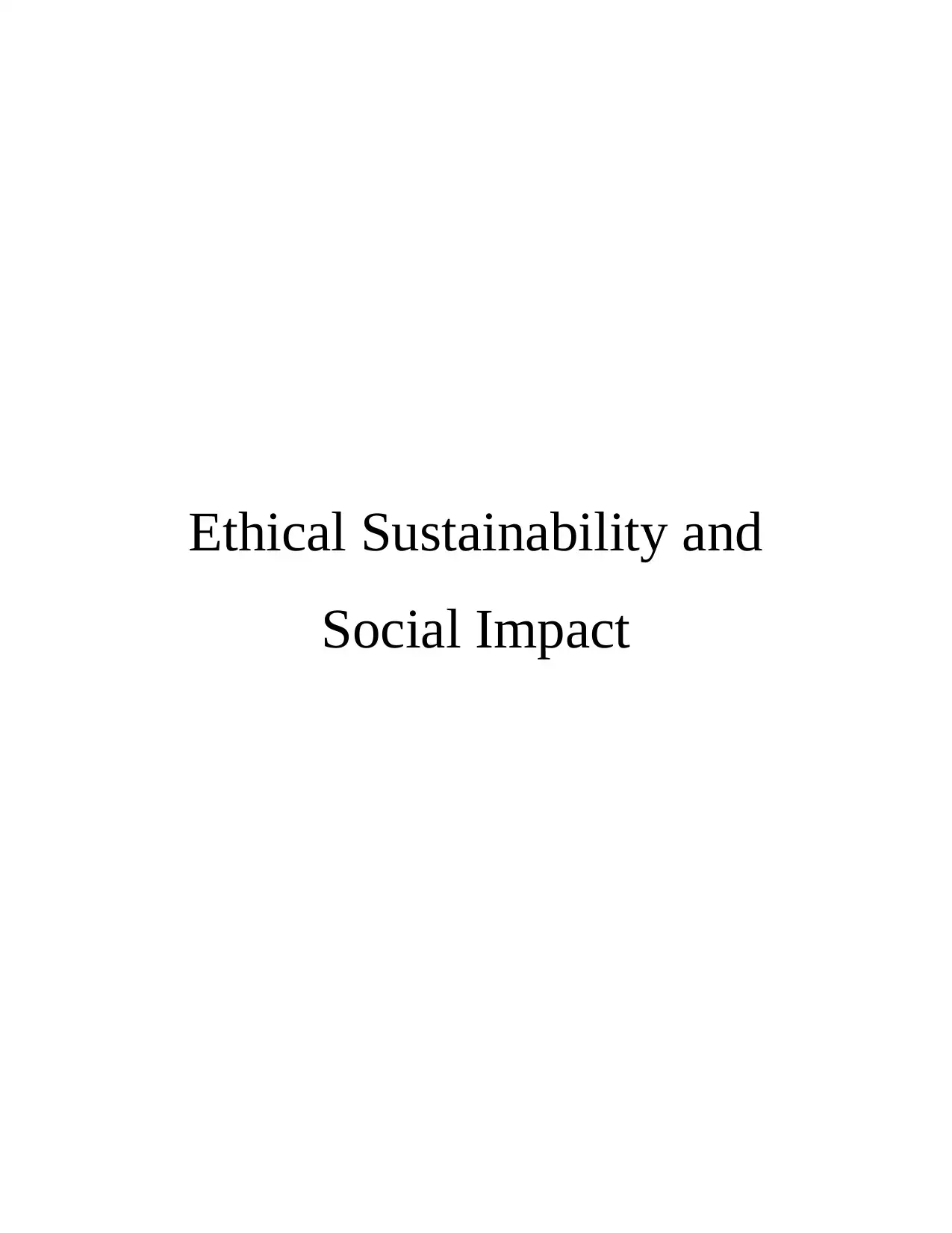
Ethical Sustainability and
Social Impact
Social Impact
Paraphrase This Document
Need a fresh take? Get an instant paraphrase of this document with our AI Paraphraser
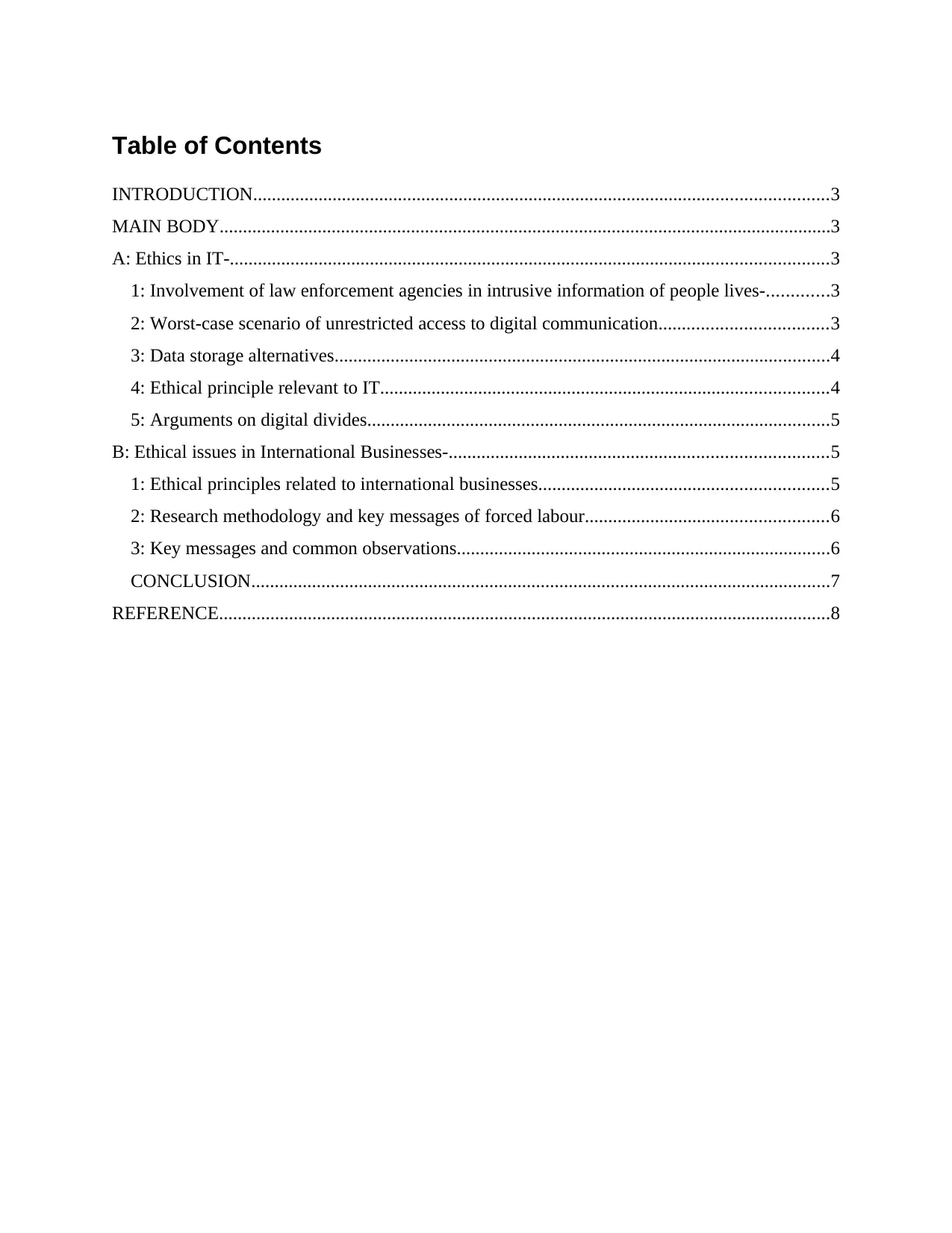
Table of Contents
INTRODUCTION...........................................................................................................................3
MAIN BODY...................................................................................................................................3
A: Ethics in IT-................................................................................................................................3
1: Involvement of law enforcement agencies in intrusive information of people lives-.............3
2: Worst-case scenario of unrestricted access to digital communication....................................3
3: Data storage alternatives..........................................................................................................4
4: Ethical principle relevant to IT................................................................................................4
5: Arguments on digital divides...................................................................................................5
B: Ethical issues in International Businesses-.................................................................................5
1: Ethical principles related to international businesses..............................................................5
2: Research methodology and key messages of forced labour....................................................6
3: Key messages and common observations................................................................................6
CONCLUSION............................................................................................................................7
REFERENCE...................................................................................................................................8
INTRODUCTION...........................................................................................................................3
MAIN BODY...................................................................................................................................3
A: Ethics in IT-................................................................................................................................3
1: Involvement of law enforcement agencies in intrusive information of people lives-.............3
2: Worst-case scenario of unrestricted access to digital communication....................................3
3: Data storage alternatives..........................................................................................................4
4: Ethical principle relevant to IT................................................................................................4
5: Arguments on digital divides...................................................................................................5
B: Ethical issues in International Businesses-.................................................................................5
1: Ethical principles related to international businesses..............................................................5
2: Research methodology and key messages of forced labour....................................................6
3: Key messages and common observations................................................................................6
CONCLUSION............................................................................................................................7
REFERENCE...................................................................................................................................8
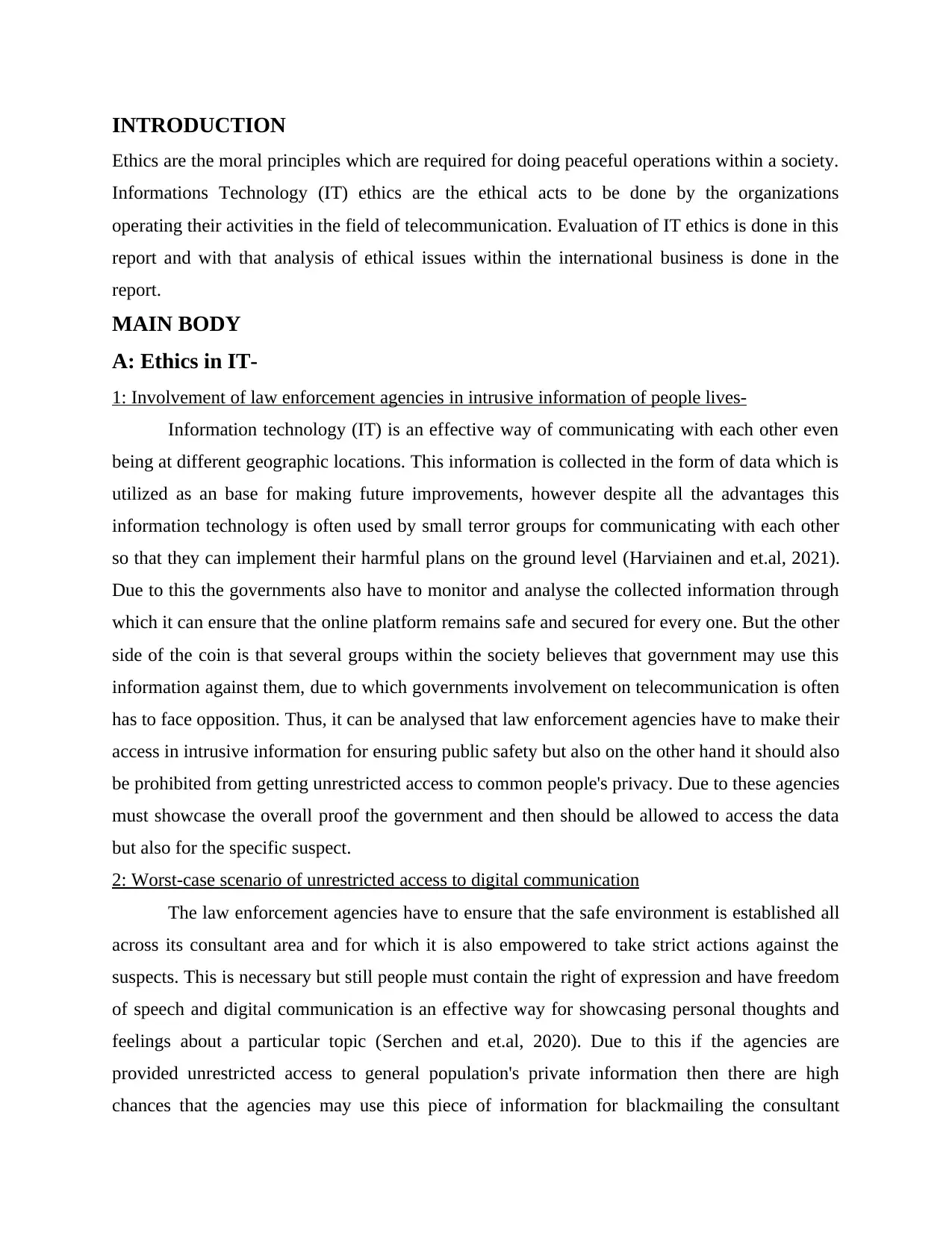
INTRODUCTION
Ethics are the moral principles which are required for doing peaceful operations within a society.
Informations Technology (IT) ethics are the ethical acts to be done by the organizations
operating their activities in the field of telecommunication. Evaluation of IT ethics is done in this
report and with that analysis of ethical issues within the international business is done in the
report.
MAIN BODY
A: Ethics in IT-
1: Involvement of law enforcement agencies in intrusive information of people lives-
Information technology (IT) is an effective way of communicating with each other even
being at different geographic locations. This information is collected in the form of data which is
utilized as an base for making future improvements, however despite all the advantages this
information technology is often used by small terror groups for communicating with each other
so that they can implement their harmful plans on the ground level (Harviainen and et.al, 2021).
Due to this the governments also have to monitor and analyse the collected information through
which it can ensure that the online platform remains safe and secured for every one. But the other
side of the coin is that several groups within the society believes that government may use this
information against them, due to which governments involvement on telecommunication is often
has to face opposition. Thus, it can be analysed that law enforcement agencies have to make their
access in intrusive information for ensuring public safety but also on the other hand it should also
be prohibited from getting unrestricted access to common people's privacy. Due to these agencies
must showcase the overall proof the government and then should be allowed to access the data
but also for the specific suspect.
2: Worst-case scenario of unrestricted access to digital communication
The law enforcement agencies have to ensure that the safe environment is established all
across its consultant area and for which it is also empowered to take strict actions against the
suspects. This is necessary but still people must contain the right of expression and have freedom
of speech and digital communication is an effective way for showcasing personal thoughts and
feelings about a particular topic (Serchen and et.al, 2020). Due to this if the agencies are
provided unrestricted access to general population's private information then there are high
chances that the agencies may use this piece of information for blackmailing the consultant
Ethics are the moral principles which are required for doing peaceful operations within a society.
Informations Technology (IT) ethics are the ethical acts to be done by the organizations
operating their activities in the field of telecommunication. Evaluation of IT ethics is done in this
report and with that analysis of ethical issues within the international business is done in the
report.
MAIN BODY
A: Ethics in IT-
1: Involvement of law enforcement agencies in intrusive information of people lives-
Information technology (IT) is an effective way of communicating with each other even
being at different geographic locations. This information is collected in the form of data which is
utilized as an base for making future improvements, however despite all the advantages this
information technology is often used by small terror groups for communicating with each other
so that they can implement their harmful plans on the ground level (Harviainen and et.al, 2021).
Due to this the governments also have to monitor and analyse the collected information through
which it can ensure that the online platform remains safe and secured for every one. But the other
side of the coin is that several groups within the society believes that government may use this
information against them, due to which governments involvement on telecommunication is often
has to face opposition. Thus, it can be analysed that law enforcement agencies have to make their
access in intrusive information for ensuring public safety but also on the other hand it should also
be prohibited from getting unrestricted access to common people's privacy. Due to these agencies
must showcase the overall proof the government and then should be allowed to access the data
but also for the specific suspect.
2: Worst-case scenario of unrestricted access to digital communication
The law enforcement agencies have to ensure that the safe environment is established all
across its consultant area and for which it is also empowered to take strict actions against the
suspects. This is necessary but still people must contain the right of expression and have freedom
of speech and digital communication is an effective way for showcasing personal thoughts and
feelings about a particular topic (Serchen and et.al, 2020). Due to this if the agencies are
provided unrestricted access to general population's private information then there are high
chances that the agencies may use this piece of information for blackmailing the consultant
⊘ This is a preview!⊘
Do you want full access?
Subscribe today to unlock all pages.

Trusted by 1+ million students worldwide
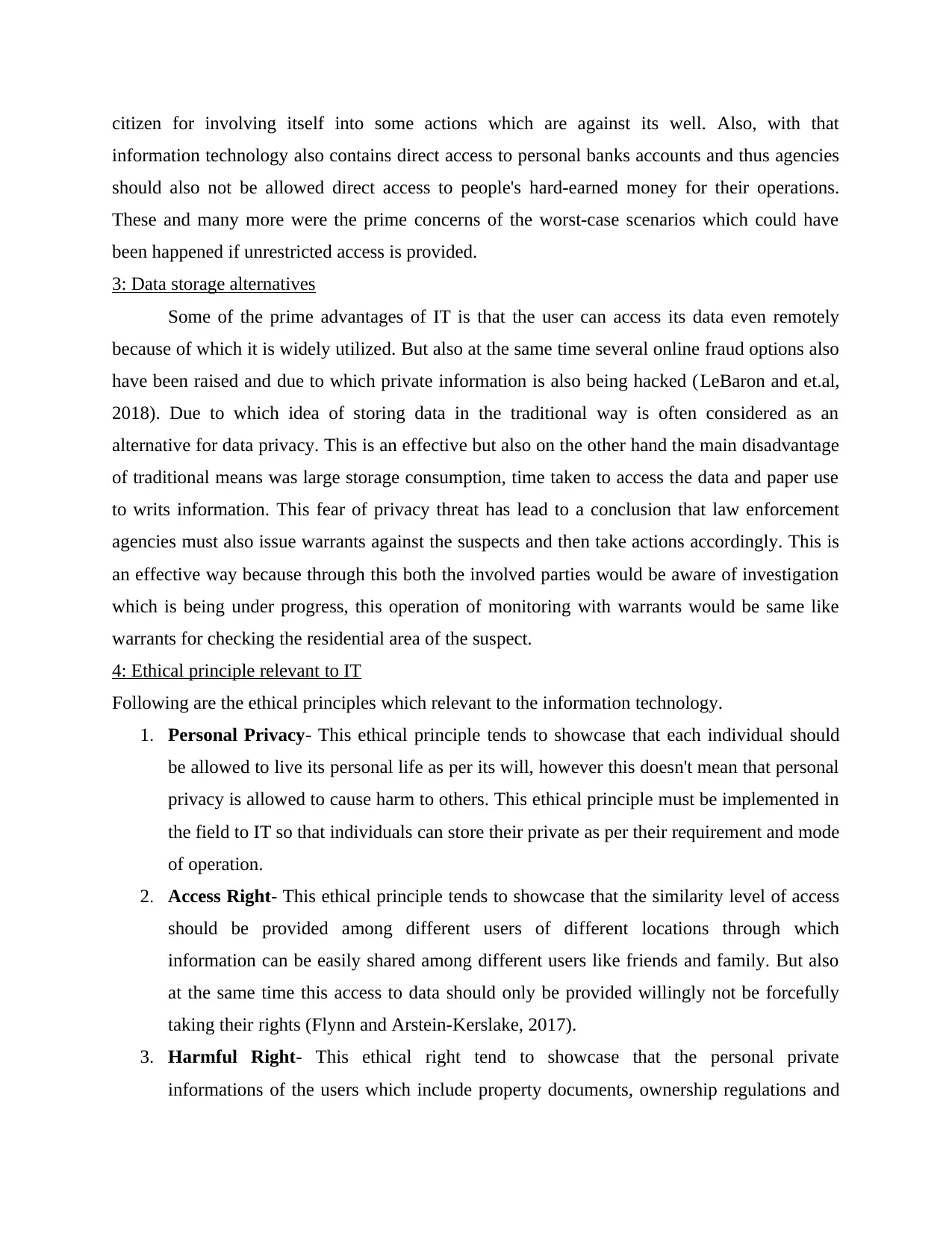
citizen for involving itself into some actions which are against its well. Also, with that
information technology also contains direct access to personal banks accounts and thus agencies
should also not be allowed direct access to people's hard-earned money for their operations.
These and many more were the prime concerns of the worst-case scenarios which could have
been happened if unrestricted access is provided.
3: Data storage alternatives
Some of the prime advantages of IT is that the user can access its data even remotely
because of which it is widely utilized. But also at the same time several online fraud options also
have been raised and due to which private information is also being hacked (LeBaron and et.al,
2018). Due to which idea of storing data in the traditional way is often considered as an
alternative for data privacy. This is an effective but also on the other hand the main disadvantage
of traditional means was large storage consumption, time taken to access the data and paper use
to writs information. This fear of privacy threat has lead to a conclusion that law enforcement
agencies must also issue warrants against the suspects and then take actions accordingly. This is
an effective way because through this both the involved parties would be aware of investigation
which is being under progress, this operation of monitoring with warrants would be same like
warrants for checking the residential area of the suspect.
4: Ethical principle relevant to IT
Following are the ethical principles which relevant to the information technology.
1. Personal Privacy- This ethical principle tends to showcase that each individual should
be allowed to live its personal life as per its will, however this doesn't mean that personal
privacy is allowed to cause harm to others. This ethical principle must be implemented in
the field to IT so that individuals can store their private as per their requirement and mode
of operation.
2. Access Right- This ethical principle tends to showcase that the similarity level of access
should be provided among different users of different locations through which
information can be easily shared among different users like friends and family. But also
at the same time this access to data should only be provided willingly not be forcefully
taking their rights (Flynn and Arstein-Kerslake, 2017).
3. Harmful Right- This ethical right tend to showcase that the personal private
informations of the users which include property documents, ownership regulations and
information technology also contains direct access to personal banks accounts and thus agencies
should also not be allowed direct access to people's hard-earned money for their operations.
These and many more were the prime concerns of the worst-case scenarios which could have
been happened if unrestricted access is provided.
3: Data storage alternatives
Some of the prime advantages of IT is that the user can access its data even remotely
because of which it is widely utilized. But also at the same time several online fraud options also
have been raised and due to which private information is also being hacked (LeBaron and et.al,
2018). Due to which idea of storing data in the traditional way is often considered as an
alternative for data privacy. This is an effective but also on the other hand the main disadvantage
of traditional means was large storage consumption, time taken to access the data and paper use
to writs information. This fear of privacy threat has lead to a conclusion that law enforcement
agencies must also issue warrants against the suspects and then take actions accordingly. This is
an effective way because through this both the involved parties would be aware of investigation
which is being under progress, this operation of monitoring with warrants would be same like
warrants for checking the residential area of the suspect.
4: Ethical principle relevant to IT
Following are the ethical principles which relevant to the information technology.
1. Personal Privacy- This ethical principle tends to showcase that each individual should
be allowed to live its personal life as per its will, however this doesn't mean that personal
privacy is allowed to cause harm to others. This ethical principle must be implemented in
the field to IT so that individuals can store their private as per their requirement and mode
of operation.
2. Access Right- This ethical principle tends to showcase that the similarity level of access
should be provided among different users of different locations through which
information can be easily shared among different users like friends and family. But also
at the same time this access to data should only be provided willingly not be forcefully
taking their rights (Flynn and Arstein-Kerslake, 2017).
3. Harmful Right- This ethical right tend to showcase that the personal private
informations of the users which include property documents, ownership regulations and
Paraphrase This Document
Need a fresh take? Get an instant paraphrase of this document with our AI Paraphraser
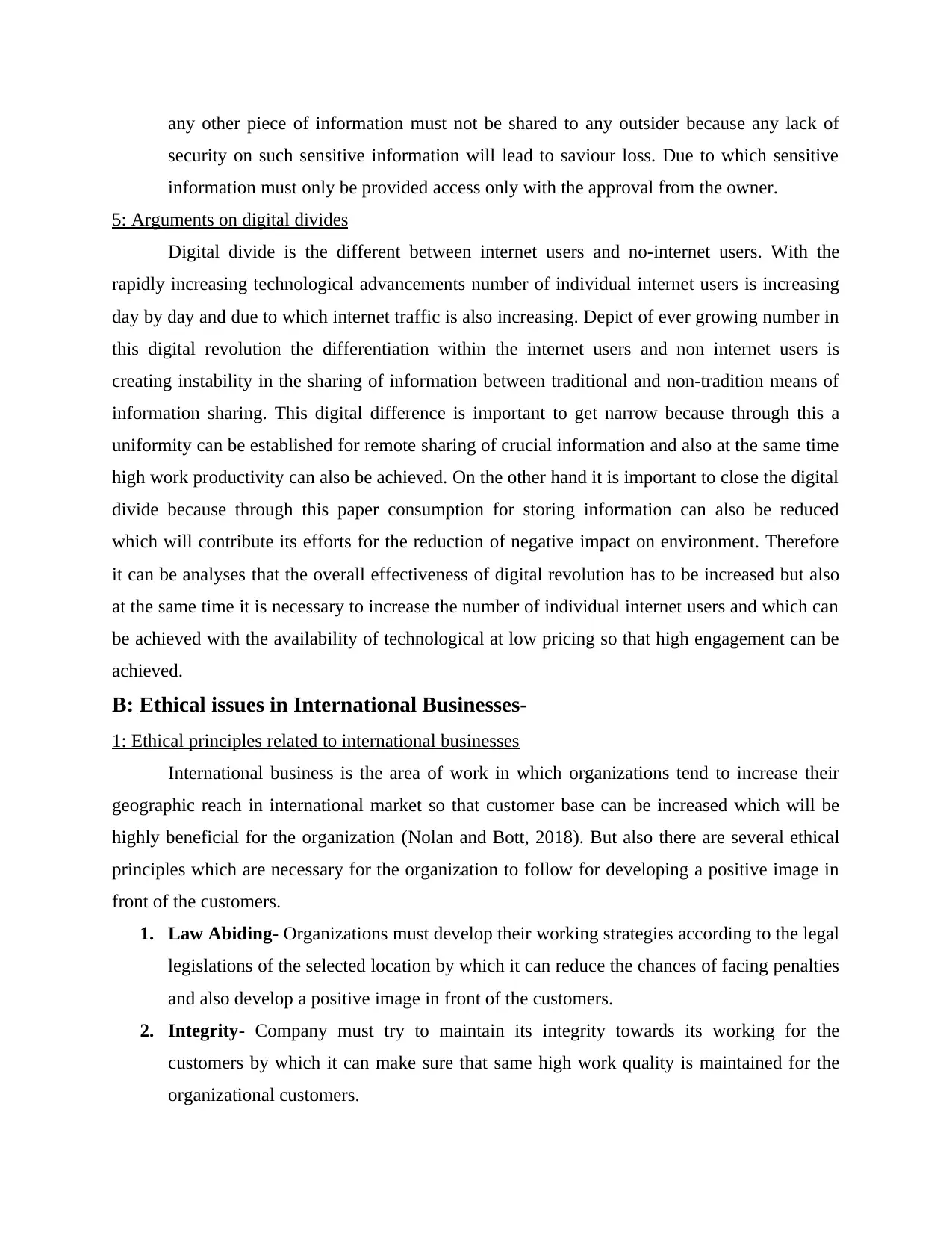
any other piece of information must not be shared to any outsider because any lack of
security on such sensitive information will lead to saviour loss. Due to which sensitive
information must only be provided access only with the approval from the owner.
5: Arguments on digital divides
Digital divide is the different between internet users and no-internet users. With the
rapidly increasing technological advancements number of individual internet users is increasing
day by day and due to which internet traffic is also increasing. Depict of ever growing number in
this digital revolution the differentiation within the internet users and non internet users is
creating instability in the sharing of information between traditional and non-tradition means of
information sharing. This digital difference is important to get narrow because through this a
uniformity can be established for remote sharing of crucial information and also at the same time
high work productivity can also be achieved. On the other hand it is important to close the digital
divide because through this paper consumption for storing information can also be reduced
which will contribute its efforts for the reduction of negative impact on environment. Therefore
it can be analyses that the overall effectiveness of digital revolution has to be increased but also
at the same time it is necessary to increase the number of individual internet users and which can
be achieved with the availability of technological at low pricing so that high engagement can be
achieved.
B: Ethical issues in International Businesses-
1: Ethical principles related to international businesses
International business is the area of work in which organizations tend to increase their
geographic reach in international market so that customer base can be increased which will be
highly beneficial for the organization (Nolan and Bott, 2018). But also there are several ethical
principles which are necessary for the organization to follow for developing a positive image in
front of the customers.
1. Law Abiding- Organizations must develop their working strategies according to the legal
legislations of the selected location by which it can reduce the chances of facing penalties
and also develop a positive image in front of the customers.
2. Integrity- Company must try to maintain its integrity towards its working for the
customers by which it can make sure that same high work quality is maintained for the
organizational customers.
security on such sensitive information will lead to saviour loss. Due to which sensitive
information must only be provided access only with the approval from the owner.
5: Arguments on digital divides
Digital divide is the different between internet users and no-internet users. With the
rapidly increasing technological advancements number of individual internet users is increasing
day by day and due to which internet traffic is also increasing. Depict of ever growing number in
this digital revolution the differentiation within the internet users and non internet users is
creating instability in the sharing of information between traditional and non-tradition means of
information sharing. This digital difference is important to get narrow because through this a
uniformity can be established for remote sharing of crucial information and also at the same time
high work productivity can also be achieved. On the other hand it is important to close the digital
divide because through this paper consumption for storing information can also be reduced
which will contribute its efforts for the reduction of negative impact on environment. Therefore
it can be analyses that the overall effectiveness of digital revolution has to be increased but also
at the same time it is necessary to increase the number of individual internet users and which can
be achieved with the availability of technological at low pricing so that high engagement can be
achieved.
B: Ethical issues in International Businesses-
1: Ethical principles related to international businesses
International business is the area of work in which organizations tend to increase their
geographic reach in international market so that customer base can be increased which will be
highly beneficial for the organization (Nolan and Bott, 2018). But also there are several ethical
principles which are necessary for the organization to follow for developing a positive image in
front of the customers.
1. Law Abiding- Organizations must develop their working strategies according to the legal
legislations of the selected location by which it can reduce the chances of facing penalties
and also develop a positive image in front of the customers.
2. Integrity- Company must try to maintain its integrity towards its working for the
customers by which it can make sure that same high work quality is maintained for the
organizational customers.
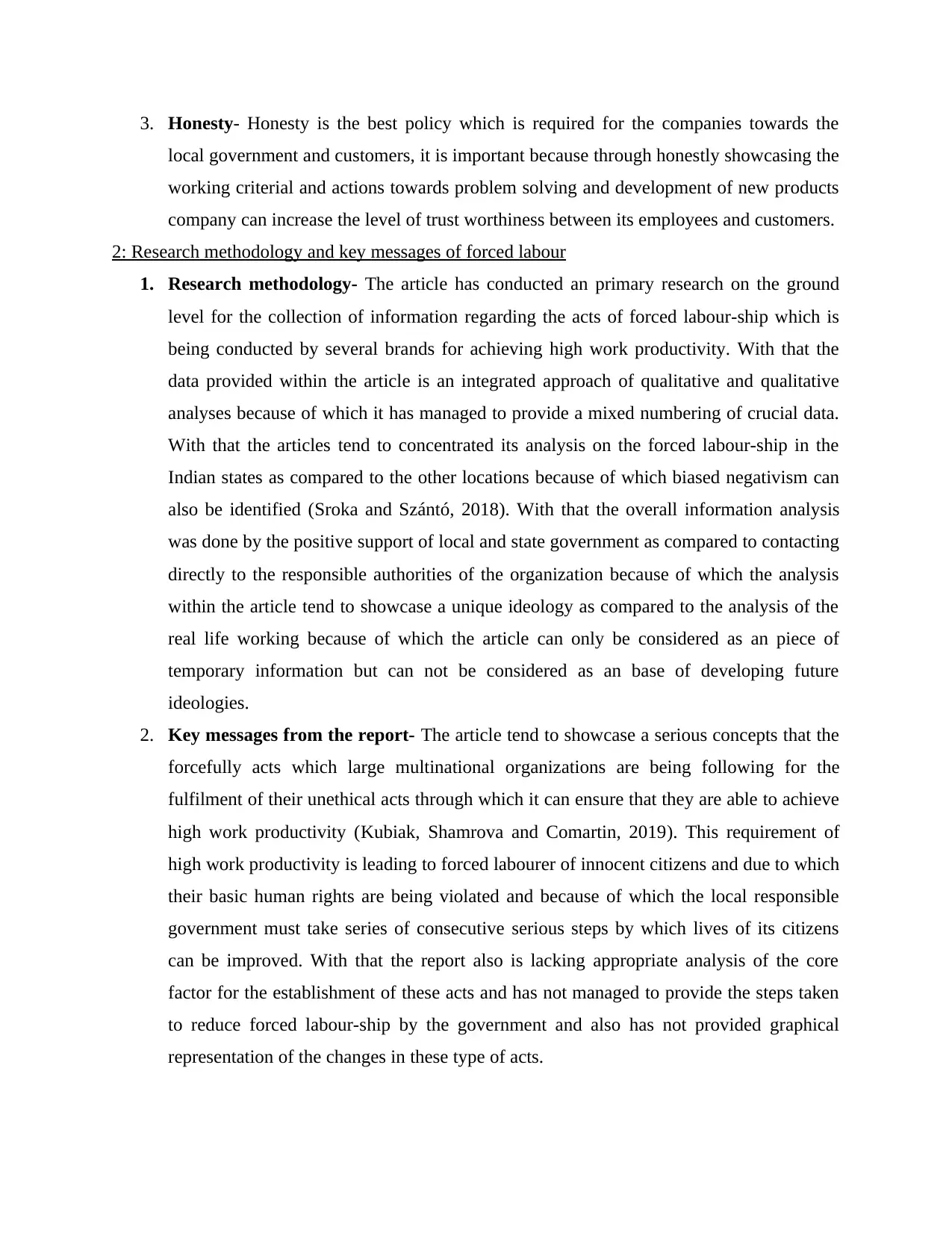
3. Honesty- Honesty is the best policy which is required for the companies towards the
local government and customers, it is important because through honestly showcasing the
working criterial and actions towards problem solving and development of new products
company can increase the level of trust worthiness between its employees and customers.
2: Research methodology and key messages of forced labour
1. Research methodology- The article has conducted an primary research on the ground
level for the collection of information regarding the acts of forced labour-ship which is
being conducted by several brands for achieving high work productivity. With that the
data provided within the article is an integrated approach of qualitative and qualitative
analyses because of which it has managed to provide a mixed numbering of crucial data.
With that the articles tend to concentrated its analysis on the forced labour-ship in the
Indian states as compared to the other locations because of which biased negativism can
also be identified (Sroka and Szántó, 2018). With that the overall information analysis
was done by the positive support of local and state government as compared to contacting
directly to the responsible authorities of the organization because of which the analysis
within the article tend to showcase a unique ideology as compared to the analysis of the
real life working because of which the article can only be considered as an piece of
temporary information but can not be considered as an base of developing future
ideologies.
2. Key messages from the report- The article tend to showcase a serious concepts that the
forcefully acts which large multinational organizations are being following for the
fulfilment of their unethical acts through which it can ensure that they are able to achieve
high work productivity (Kubiak, Shamrova and Comartin, 2019). This requirement of
high work productivity is leading to forced labourer of innocent citizens and due to which
their basic human rights are being violated and because of which the local responsible
government must take series of consecutive serious steps by which lives of its citizens
can be improved. With that the report also is lacking appropriate analysis of the core
factor for the establishment of these acts and has not managed to provide the steps taken
to reduce forced labour-ship by the government and also has not provided graphical
representation of the changes in these type of acts.
local government and customers, it is important because through honestly showcasing the
working criterial and actions towards problem solving and development of new products
company can increase the level of trust worthiness between its employees and customers.
2: Research methodology and key messages of forced labour
1. Research methodology- The article has conducted an primary research on the ground
level for the collection of information regarding the acts of forced labour-ship which is
being conducted by several brands for achieving high work productivity. With that the
data provided within the article is an integrated approach of qualitative and qualitative
analyses because of which it has managed to provide a mixed numbering of crucial data.
With that the articles tend to concentrated its analysis on the forced labour-ship in the
Indian states as compared to the other locations because of which biased negativism can
also be identified (Sroka and Szántó, 2018). With that the overall information analysis
was done by the positive support of local and state government as compared to contacting
directly to the responsible authorities of the organization because of which the analysis
within the article tend to showcase a unique ideology as compared to the analysis of the
real life working because of which the article can only be considered as an piece of
temporary information but can not be considered as an base of developing future
ideologies.
2. Key messages from the report- The article tend to showcase a serious concepts that the
forcefully acts which large multinational organizations are being following for the
fulfilment of their unethical acts through which it can ensure that they are able to achieve
high work productivity (Kubiak, Shamrova and Comartin, 2019). This requirement of
high work productivity is leading to forced labourer of innocent citizens and due to which
their basic human rights are being violated and because of which the local responsible
government must take series of consecutive serious steps by which lives of its citizens
can be improved. With that the report also is lacking appropriate analysis of the core
factor for the establishment of these acts and has not managed to provide the steps taken
to reduce forced labour-ship by the government and also has not provided graphical
representation of the changes in these type of acts.
⊘ This is a preview!⊘
Do you want full access?
Subscribe today to unlock all pages.

Trusted by 1+ million students worldwide
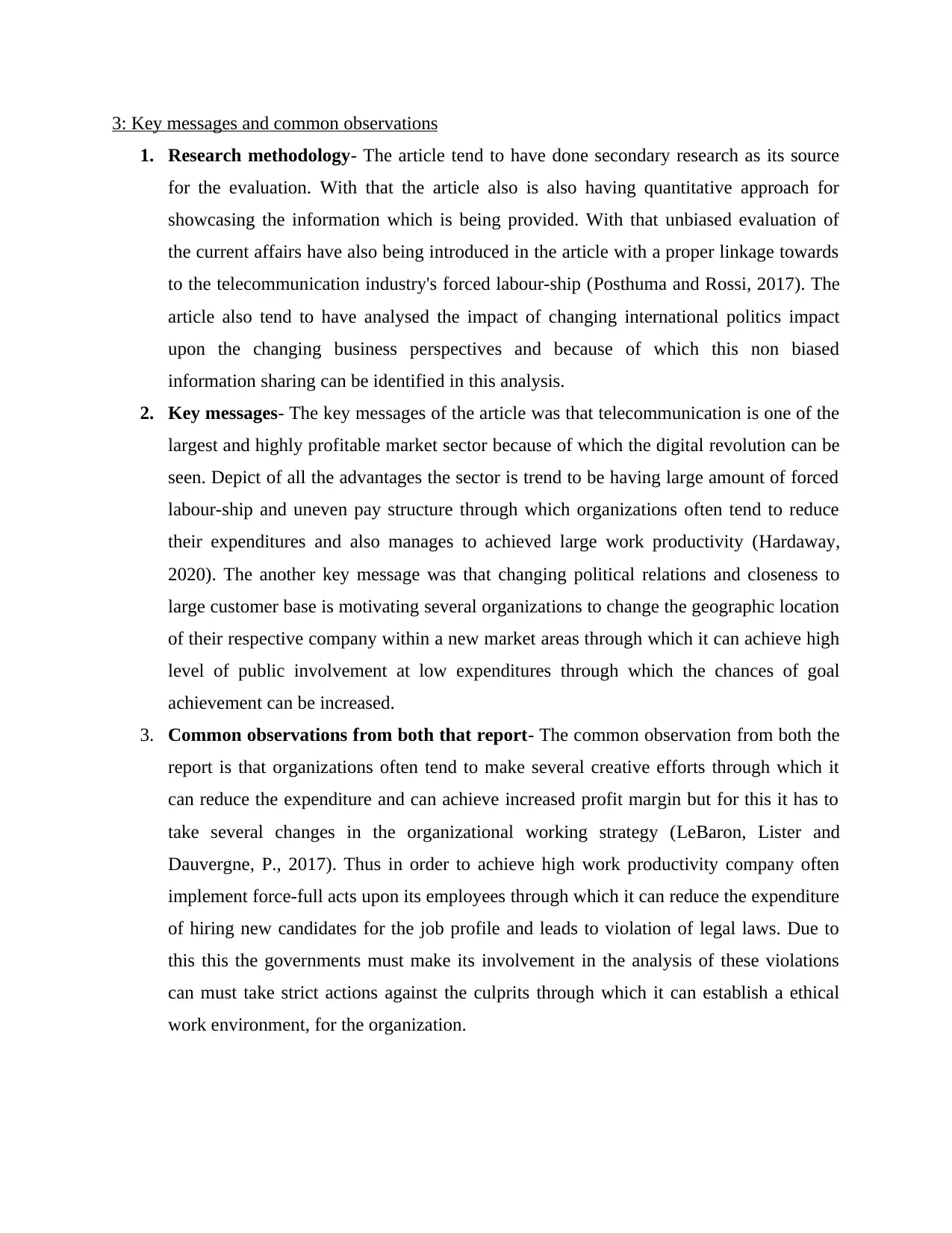
3: Key messages and common observations
1. Research methodology- The article tend to have done secondary research as its source
for the evaluation. With that the article also is also having quantitative approach for
showcasing the information which is being provided. With that unbiased evaluation of
the current affairs have also being introduced in the article with a proper linkage towards
to the telecommunication industry's forced labour-ship (Posthuma and Rossi, 2017). The
article also tend to have analysed the impact of changing international politics impact
upon the changing business perspectives and because of which this non biased
information sharing can be identified in this analysis.
2. Key messages- The key messages of the article was that telecommunication is one of the
largest and highly profitable market sector because of which the digital revolution can be
seen. Depict of all the advantages the sector is trend to be having large amount of forced
labour-ship and uneven pay structure through which organizations often tend to reduce
their expenditures and also manages to achieved large work productivity (Hardaway,
2020). The another key message was that changing political relations and closeness to
large customer base is motivating several organizations to change the geographic location
of their respective company within a new market areas through which it can achieve high
level of public involvement at low expenditures through which the chances of goal
achievement can be increased.
3. Common observations from both that report- The common observation from both the
report is that organizations often tend to make several creative efforts through which it
can reduce the expenditure and can achieve increased profit margin but for this it has to
take several changes in the organizational working strategy (LeBaron, Lister and
Dauvergne, P., 2017). Thus in order to achieve high work productivity company often
implement force-full acts upon its employees through which it can reduce the expenditure
of hiring new candidates for the job profile and leads to violation of legal laws. Due to
this this the governments must make its involvement in the analysis of these violations
can must take strict actions against the culprits through which it can establish a ethical
work environment, for the organization.
1. Research methodology- The article tend to have done secondary research as its source
for the evaluation. With that the article also is also having quantitative approach for
showcasing the information which is being provided. With that unbiased evaluation of
the current affairs have also being introduced in the article with a proper linkage towards
to the telecommunication industry's forced labour-ship (Posthuma and Rossi, 2017). The
article also tend to have analysed the impact of changing international politics impact
upon the changing business perspectives and because of which this non biased
information sharing can be identified in this analysis.
2. Key messages- The key messages of the article was that telecommunication is one of the
largest and highly profitable market sector because of which the digital revolution can be
seen. Depict of all the advantages the sector is trend to be having large amount of forced
labour-ship and uneven pay structure through which organizations often tend to reduce
their expenditures and also manages to achieved large work productivity (Hardaway,
2020). The another key message was that changing political relations and closeness to
large customer base is motivating several organizations to change the geographic location
of their respective company within a new market areas through which it can achieve high
level of public involvement at low expenditures through which the chances of goal
achievement can be increased.
3. Common observations from both that report- The common observation from both the
report is that organizations often tend to make several creative efforts through which it
can reduce the expenditure and can achieve increased profit margin but for this it has to
take several changes in the organizational working strategy (LeBaron, Lister and
Dauvergne, P., 2017). Thus in order to achieve high work productivity company often
implement force-full acts upon its employees through which it can reduce the expenditure
of hiring new candidates for the job profile and leads to violation of legal laws. Due to
this this the governments must make its involvement in the analysis of these violations
can must take strict actions against the culprits through which it can establish a ethical
work environment, for the organization.
Paraphrase This Document
Need a fresh take? Get an instant paraphrase of this document with our AI Paraphraser
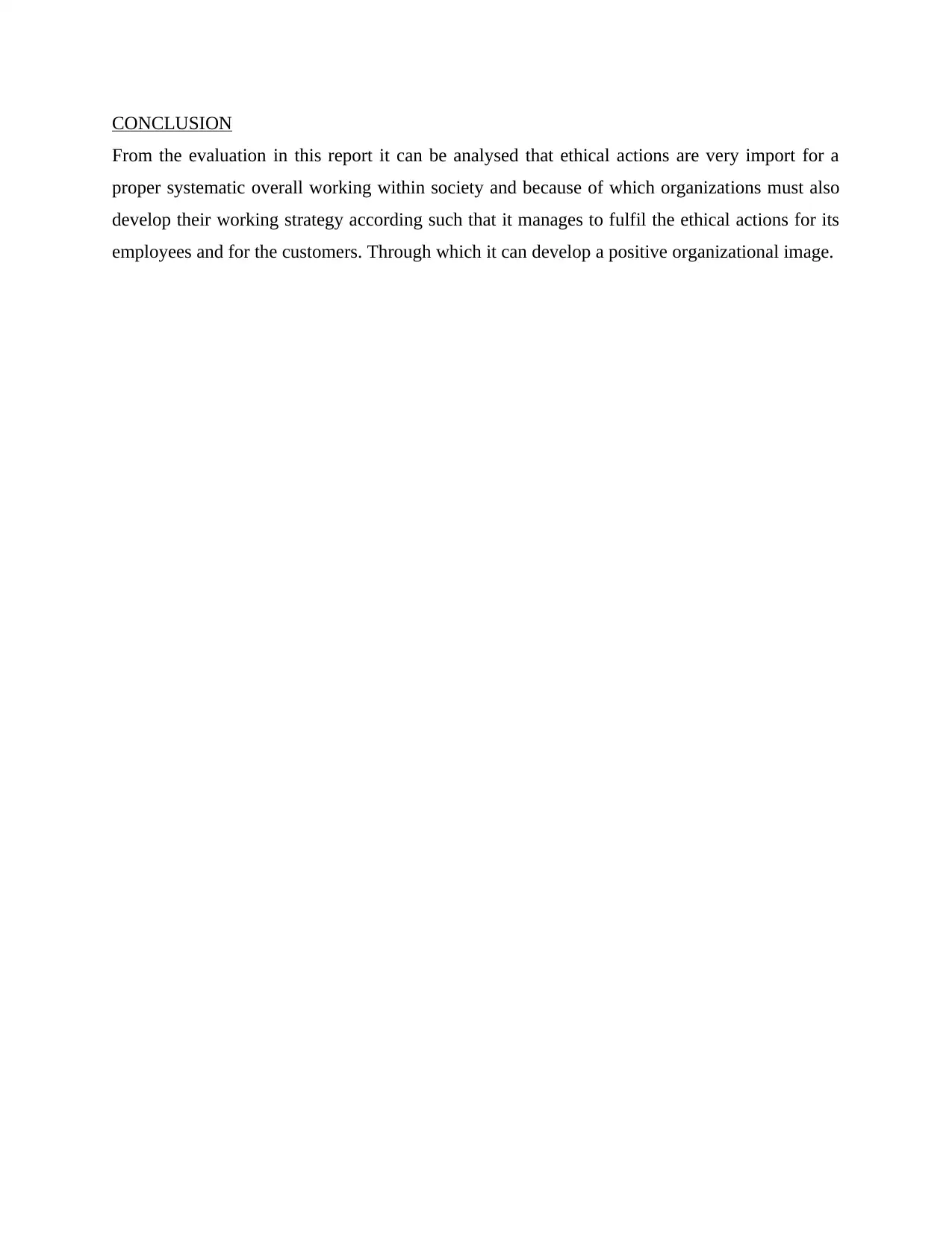
CONCLUSION
From the evaluation in this report it can be analysed that ethical actions are very import for a
proper systematic overall working within society and because of which organizations must also
develop their working strategy according such that it manages to fulfil the ethical actions for its
employees and for the customers. Through which it can develop a positive organizational image.
From the evaluation in this report it can be analysed that ethical actions are very import for a
proper systematic overall working within society and because of which organizations must also
develop their working strategy according such that it manages to fulfil the ethical actions for its
employees and for the customers. Through which it can develop a positive organizational image.
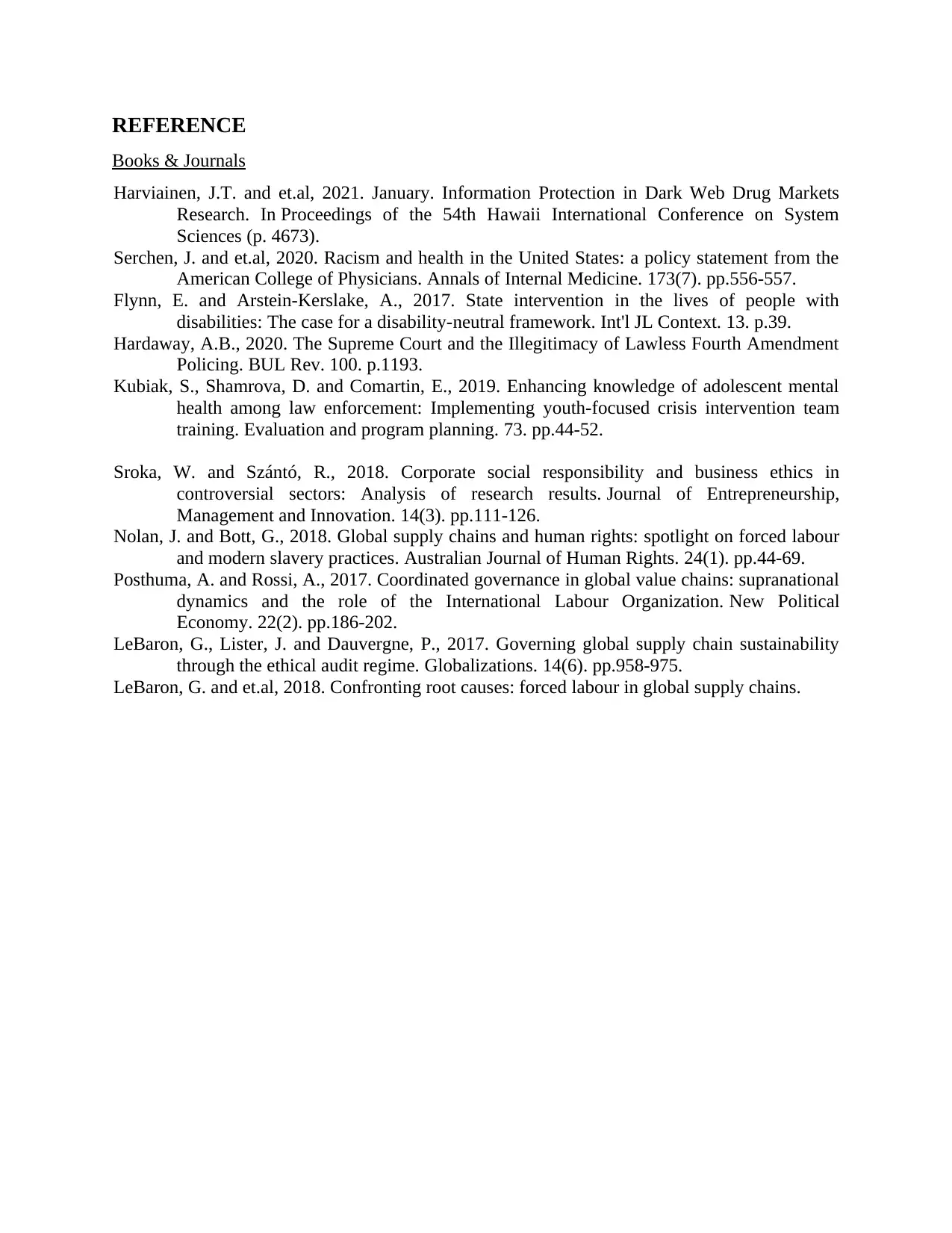
REFERENCE
Books & Journals
Harviainen, J.T. and et.al, 2021. January. Information Protection in Dark Web Drug Markets
Research. In Proceedings of the 54th Hawaii International Conference on System
Sciences (p. 4673).
Serchen, J. and et.al, 2020. Racism and health in the United States: a policy statement from the
American College of Physicians. Annals of Internal Medicine. 173(7). pp.556-557.
Flynn, E. and Arstein-Kerslake, A., 2017. State intervention in the lives of people with
disabilities: The case for a disability-neutral framework. Int'l JL Context. 13. p.39.
Hardaway, A.B., 2020. The Supreme Court and the Illegitimacy of Lawless Fourth Amendment
Policing. BUL Rev. 100. p.1193.
Kubiak, S., Shamrova, D. and Comartin, E., 2019. Enhancing knowledge of adolescent mental
health among law enforcement: Implementing youth-focused crisis intervention team
training. Evaluation and program planning. 73. pp.44-52.
Sroka, W. and Szántó, R., 2018. Corporate social responsibility and business ethics in
controversial sectors: Analysis of research results. Journal of Entrepreneurship,
Management and Innovation. 14(3). pp.111-126.
Nolan, J. and Bott, G., 2018. Global supply chains and human rights: spotlight on forced labour
and modern slavery practices. Australian Journal of Human Rights. 24(1). pp.44-69.
Posthuma, A. and Rossi, A., 2017. Coordinated governance in global value chains: supranational
dynamics and the role of the International Labour Organization. New Political
Economy. 22(2). pp.186-202.
LeBaron, G., Lister, J. and Dauvergne, P., 2017. Governing global supply chain sustainability
through the ethical audit regime. Globalizations. 14(6). pp.958-975.
LeBaron, G. and et.al, 2018. Confronting root causes: forced labour in global supply chains.
Books & Journals
Harviainen, J.T. and et.al, 2021. January. Information Protection in Dark Web Drug Markets
Research. In Proceedings of the 54th Hawaii International Conference on System
Sciences (p. 4673).
Serchen, J. and et.al, 2020. Racism and health in the United States: a policy statement from the
American College of Physicians. Annals of Internal Medicine. 173(7). pp.556-557.
Flynn, E. and Arstein-Kerslake, A., 2017. State intervention in the lives of people with
disabilities: The case for a disability-neutral framework. Int'l JL Context. 13. p.39.
Hardaway, A.B., 2020. The Supreme Court and the Illegitimacy of Lawless Fourth Amendment
Policing. BUL Rev. 100. p.1193.
Kubiak, S., Shamrova, D. and Comartin, E., 2019. Enhancing knowledge of adolescent mental
health among law enforcement: Implementing youth-focused crisis intervention team
training. Evaluation and program planning. 73. pp.44-52.
Sroka, W. and Szántó, R., 2018. Corporate social responsibility and business ethics in
controversial sectors: Analysis of research results. Journal of Entrepreneurship,
Management and Innovation. 14(3). pp.111-126.
Nolan, J. and Bott, G., 2018. Global supply chains and human rights: spotlight on forced labour
and modern slavery practices. Australian Journal of Human Rights. 24(1). pp.44-69.
Posthuma, A. and Rossi, A., 2017. Coordinated governance in global value chains: supranational
dynamics and the role of the International Labour Organization. New Political
Economy. 22(2). pp.186-202.
LeBaron, G., Lister, J. and Dauvergne, P., 2017. Governing global supply chain sustainability
through the ethical audit regime. Globalizations. 14(6). pp.958-975.
LeBaron, G. and et.al, 2018. Confronting root causes: forced labour in global supply chains.
⊘ This is a preview!⊘
Do you want full access?
Subscribe today to unlock all pages.

Trusted by 1+ million students worldwide
1 out of 9
Related Documents
Your All-in-One AI-Powered Toolkit for Academic Success.
+13062052269
info@desklib.com
Available 24*7 on WhatsApp / Email
![[object Object]](/_next/static/media/star-bottom.7253800d.svg)
Unlock your academic potential
Copyright © 2020–2026 A2Z Services. All Rights Reserved. Developed and managed by ZUCOL.





